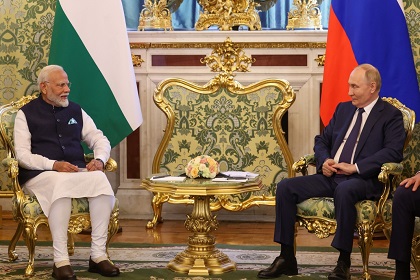Bangladesh: Frying Pan to Fire
Bangladesh’s economy has been in distress for some time and is not doing as well as assumed. This could have been one of the factors that drove the protests and the subsequent coup.
 Courtesy:
Courtesy:
Bangladesh’s economy has been in distress for some time and is not doing as well as assumed. This could have been one of the factors that drove the protests and the subsequent coup.
 Courtesy:
Courtesy:
Sheikh Hasina’s recent ouster as the Prime Minister has highlighted the deep fissures in Bangladeshi society and pushed the subcontinent into political turbulence. Amb. Rajiv Bhatia, Distinguished Fellow for Foreign Policy Studies, Gateway House, speaks about the political, economic, and security implications the crisis in Bangladesh has for Indian foreign policy and geopolitics in the neighbourhood and beyond.
 Courtesy: FinShots
Courtesy: FinShots
The term Global South is no less ambiguous today than when it first originated in the 1960s. This time though, it is a big tent that accommodates all non-West aspirations, from the G77 to the Non-Aligned Movement to the Third World. It is a geopolitical fact rather than a geographical demarcation whose appeal lies in its ability to get to the heart of shared priorities and goals.
 Courtesy:
Courtesy:
Bangladesh Prime Minister Sheikh Hasina's forced resignation on August 5 came amidst prolonged and violent anti-government protests. Lt Gel S L Narasimhan, the Adjunct Distinguished Fellow for China and National Security Studies, Gateway House, analyzes the role of the army and external actors, and the strategic and security implications for India.
 Courtesy:
Courtesy:
The Quad foreign ministers meeting, held in Tokyo on July 29, took a clear position against China’s coercive actions in the East and South China seas. The four ministers have done their bit by reviewing the progress of the grouping’s many initiatives and reiterating its commitment to a free and open Indo-Pacific. For continued progress, the Quad now needs solid initiative from the top leadership – and a summit at the earliest.
 Courtesy:
Courtesy:
A timely book on the Naga contribution to Allied victory in the Second World War is a necessary documentation. Northeast India was the eastern flank of the British empire where the battles of Kohima and Imphal stopped Japan’s invasion into India. While western historical narratives are being reiterated during the war’s 80th anniversary, the role and sacrifice of the Nagas is a neglected but important counterpoint.
 Courtesy:
Courtesy:
China and India both give great importance to their neighbours – the former through its Friendly Neighbourhood policy, the latter through Neighbourhood First. Although China has been increasing its influence in the region, narratives that say that India is losing out to China lack in-depth analysis. To deduce the future trajectory of China in South Asia, it is important to study both China’s and India’s relations with each of these countries, as also with each other.
 Courtesy:
Courtesy:
The last two weeks have been turbulent for U.S. politics: a past President and current candidate survives an assassination attempt; the current President is forced to withdraw from contesting and is replaced by a new nominee in a flash. This is set in the backdrop of tumultuous domestic and international politics. Neelam Deo, co-founder, Gateway House, discusses the U.S.’ electoral race and its implications for global geopolitics.
 Courtesy:
Courtesy:
Thousands of Ladakhi Shia men and women in Kargil mourned the death of Iranian President Ebrahimi Raisi on May 21, 2024. Iran’s influence in the region goes back to the 15th century with the arrival of Shia missionaries. Their identity was reinforced by the Iranian Revolution in 1979. The cultural and religious practices of the Iranian-influenced community underscore the local politics in the sensitive border region.
 Courtesy:
Courtesy:
The 22nd India-Russia summit, held in Moscow on July 9 during Prime Minister Modi’s official visit, focused on expanding bilateral economic, energy, cultural and defense cooperation. It indicates the two nations’ commitment to adding substance and new momentum to their relationship. The long-delayed summit, which coincided with the NATO summit in Washington, should be viewed through the wider lens of a multipolar world.